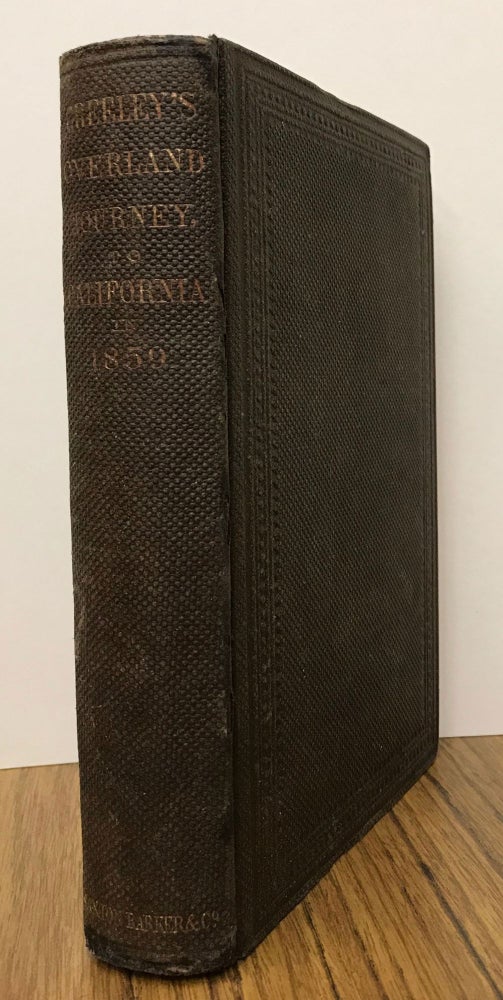An overland journey, from New York to San Francisco, in the summer of 1859. By Horace Greeley. New York: C. M. Saxton, Barker & Co. San Francisco: H. H. Bancroft and Co., 1860. 18.9x11.9 cm (12mo), pp. [1-3] 4 [5] 6 [7] 8-386 [387-396: ads], flyleaves at front and rear, original black pebbled cloth, front and rear panels stamped in blind, spine panel stamped in gold and blind, light yellow endpapers. First edition. First publication in book form of letters written by Greeley originally published in the New York Tribune during his overland journey from New York City to California by way of Kansas and Utah. Greeley's account of his visit to Yosemite Valley and the Mariposa Grove of Big Trees is found on pages [295]-316. In the late 1850s "the stream of tourists who entered the valley grew apace in spite of the hardships to be endured on the long journey in the saddle. Horace Greeley was one of those who braved the discomforts in 1859 and gave his description of the place to hundreds of thousands in the East. Greeley, foolishly, determined to make the 57-mile saddle trip via the Mariposa route in one day. He arrived at the Upper Hotel at 1:00 A.M., more dead than alive, yet shortly afterward he wrote, 'I know no single wonder of Nature on earth which can claim a superiority over the Yosemite.' His visit was made at a season when Yosemite Falls contained but little water, and he dubbed them a 'humbug,' but his hearty praise of the general wonders played a significant part in turning the interest of Easterners upon the new mecca of scenic beauty" (Russell, One Hundred Years in Yosemite [1947], p.58). Horace Greeley (1811-1872), American social reformer, politician, journalist and publisher, founded the New York Tribune in 1841. "During the late fifties the Tribune attained a national influence far surpassing that of any rival ... Many elements entered into its influence, but the greatest was the passionate moral earnestness of Greeley himself ..." (DAB). Devastated by the death of his wife five days before the 1872 presidential election which he lost by a landslide, and his loss of control of the editorship of the Tribune which had been his lifelong pride to Whitelaw Reid, "his mind and body both broke, and he died insane on November 29. A shocked nation paid him in death the tribute he had never received while living ... His failings were forgotten, while the services he had done the republic as its greatest editor, perhaps its greatest popular educator, and certainly one of its greatest moral leaders, were universally recalled" (Ibid.). Howes G355. Sabin 28940. Wagner, Camp, Becker (1982) 359. Cowan (1933), p. 247. Shallow loss to cloth at upper and lower spine ends, but a very good, better than average copy. (#166747).
No statement of printing.


